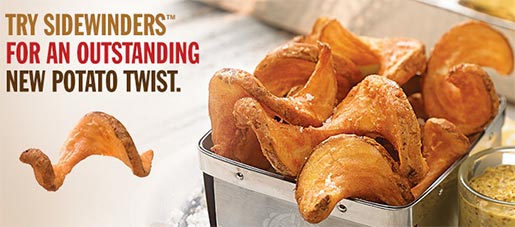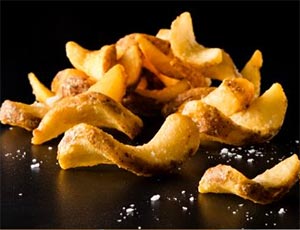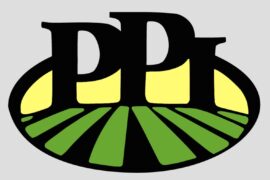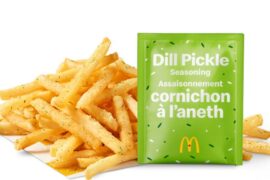The US armed forces pack an arsenal of Sidewinder air-to-air missiles to take down hostile adversaries. On another battlefield, J.R. Simplot has deployed a squadron of attorneys to defend its Sidewinder brand of potato fries in the marketplace.
The lawyers have fired for effect as the fierce rivalry between two of the world’s leading frozen potato product companies recently widened from the foodservice front and retail freezer aisles to the courtroom as a result of a lawsuit initiated by Simplot against rival McCain Foods USA. Alleging that “ornamental features” of its Sidewinders fried potatoes have been copied, Simplot is claiming patent infringement, trade dress infringement and unfair competition from McCain’s introduction of Twisted Potatoes.
 Simplot’s promotion appeals to customers to “Try Sidewinders for an Outstanding New Potato Twist.”
Simplot’s promotion appeals to customers to “Try Sidewinders for an Outstanding New Potato Twist.”
According to the complaint filed by Boise, Idaho-headquartered J.R. Simplot with the United States District Court in Idaho: “McCain’s conduct has caused and will cause great and irreparable harm to Simplot in an amount which cannot be adequately remedied by money damages, leaving Simplot with no adequate remedy at law.”
 Lisle, Illinois-based McCain USA has until November 16 to respond to the complaint.
Lisle, Illinois-based McCain USA has until November 16 to respond to the complaint.
Simplot launched Sidewinder fries featuring a “distinctive twist design” in 2013 and enjoyed an “overnight success,” according to the lawsuit. Sold in all 50 American states and abroad, they fast became one of the company’s most well known and bestselling new brands. In 2014, it invested in reconfiguring production lines and added additional hardware to its Caldwell factory to keep up with increasing consumer demand for the product.
Unlike traditional straight-cut, lattice-cut or curly fries, Sidewinders were designed and introduced as an alternative to conventionally shaped french fries and are offered in several varieties including Bent Arm Ale Craft Beer Battered, Seasoned Crisp Smokey Barbecue, JR Buffalos and Conquest Sidewinders.
 McCain Twisted Potatoes are advertised by the company as “traditional potatoes cut into wedges and twisted, coated with a golden batter to create a unique product and superior yield.”The lawsuit claims that McCain Foods, “rather than develop its own unique frozen potato design, copied Simplot’s popular and protected Sidewinders design.” It further asserts that McCain designed its competitive “Twisted Potato” products “to look like Simplot’s Sidewinders in an attempt to piggyback off of Simplot’s investment and to ride the coattails of Simplot’s success.”
McCain Twisted Potatoes are advertised by the company as “traditional potatoes cut into wedges and twisted, coated with a golden batter to create a unique product and superior yield.”The lawsuit claims that McCain Foods, “rather than develop its own unique frozen potato design, copied Simplot’s popular and protected Sidewinders design.” It further asserts that McCain designed its competitive “Twisted Potato” products “to look like Simplot’s Sidewinders in an attempt to piggyback off of Simplot’s investment and to ride the coattails of Simplot’s success.”
In June, according to Simplot, “McCain began advertising, promoting, and offering its copycat Twisted Potato products for sale in the United States in an effort to unfairly compete against Simplot and cut into Simplot’s 100% share of the Sidewinders market.”
The Twisted Potato fries are “deceptively and confusing similar” to the Simplot’s fries and customers are “likely to confuse the products and their sources of origin,” according to the suit.
Simplot’s legal team, headed by Dana M. Herberholz of Parsons, Behle & Latimer, wants the court to award three times the damages, with the amount to be determined during a jury trial, to compensate for what it calls “willful” patent infringement plus interest. It also seeks a permanent injunction to keep McCain from further infringement.





